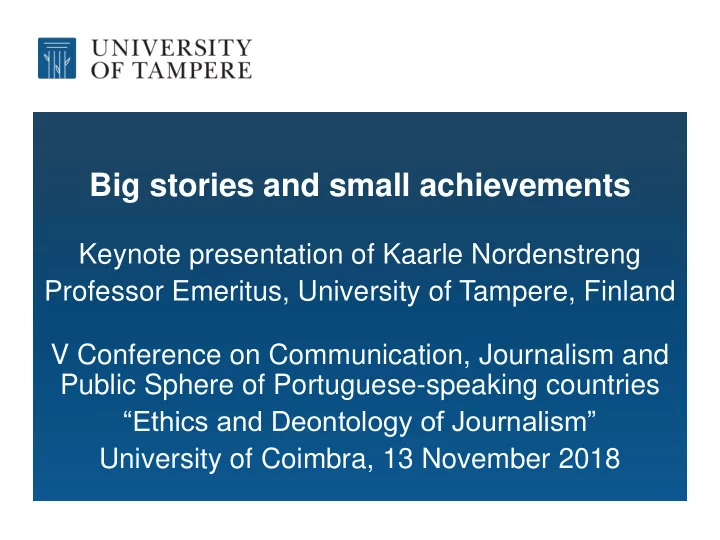

Big stories and small achievements Keynote presentation of Kaarle Nordenstreng Professor Emeritus, University of Tampere, Finland V Conference on Communication, Journalism and Public Sphere of Portuguese-speaking countries “Ethics and Deontology of Journalism” University of Coimbra, 13 November 2018
Traditions of f normative th thin inking 1. Corporatist: search for public wisdom (500 BC – 1500 AD) 2. Libertarian : opening for personal freedom (1500 – 1800) 3. Social responsibility : growth of popular democracies (1800 – 1970) 4. Citizen participation : rise of postmodern cultures (1970 – )
Figure 1. Four media types
His istorical fu functions of f jo journalism From Michael Schudson’s The Power of News (1995) etc Advocacy: journalism as extension of social movements, journalists as partisan fighters Market: journalism incorporated in commercial enterprises, journalists as neutral observers Trustee: j ournalism representing the people, journalists as advocates of civil society
Metaphors of f th the th the his istorical stages Journalism/ts first like a tree firmly rooted on the ground, then like a bird autonomously moving in the air, but in reality like a kite steered from the ground.
The pla lace of f eth thics and MAS in in his istory Ethics and Media Accountability Systems (MAS) grew out of the second stage of a bird in the commercial sky as justification for autonomy and as remedies of breaking norms – as a response to market forces. So ethics does not only stand for high values but also for a defensive strategy . And now a reminder of central concepts , beginning with Denis McQuail’s scheme – first drafted while he visited the University of Minho:
Types of f regulating media in in society 1. Law by parliament and state bodies 2. Market by property, consumers, advertising, etc. 3. Citizens by associations, etc. 4. Media themselves by journalistic/business professionals Of these, 2 – 4 are MAS See also Co-regulatory Measures in the Media Sector – A Promising Regulatory Tool? http://ec.europa.eu/archives/information_society/avpolicy/docs/ library/studies/coregul/ppt_seminar.pdf (Nordenstreng pp. 11-19)
Means of f promoting quality and eth thics From A History of the International Movement of Journalists: Professionalism Versus Politics (2016) etc Professionalism : collective identity and interests (1860-) Associations : national guilds, international unions (1890-) Education : schools of journalism (1900-) Self-regulation : codes of ethics (1920-), courts of honour (1930-) Media literacy : media education in schools (1970-) Media criticism : audience associations (1980-) Media ombudsmen : individual media arbitrators (1990-)
http://tampub.uta.fi/bitstream/handle/10024/66151/ self_regulation_2010.pdf?sequence=1&isAllowed=y
My four conclusions in in 2010 1. Journalistic responsibility is inseparable from media freedom and a central concept for understanding media in society. 2. Self-regulation is an important but limited form of media regulation, not to be taken at face value. 3. There is a common core of ethical standards in the professional codes of journalism in Europe, and these can be condensed into a common set of ethical principles. 4. There is a growing concern about professional ethics and quality among journalists, academics and general public, and this concern can be formalized into a European platform to promote media quality, ethics and self- regulation as a mechanism of media control.
Are th these conclusions sti till valid? • Yes: none of the four points has been made outdated by the developments in the past decade (digitalization, etc). • However, social media have complicated the configurations as media production and consumption are no longer clearly separate and the limits of journalism get blurred. • Nevertheless the conceptual distinctions of McQuail are still valid and a common core of ethical standards in Europe remains , although surrounded by conflicts and confusion. • A real European platform to ensure media accountability is more topical than before: high time to return to the initiatives of the Council of Europe’s Parliamentrary Assembly in 1993 and the EU’s High -Level Group on Media Freedom and Pluralism in 2013 – both frozen by fierce opposition from the media proprietors’ associations.
Media Accountability and Transparency in in Europe MediaAct project http://www.mediaact.eu/ Journalists and Media Accountability: An International Study of News People in the Digital Age (ed by Fengler & al. 2014) Empirical survey of 1200 journalists in 12 European and two Arab countries shows that they dislike state intervention – regulation by law. At the same time: journalists from most European countries have relatively little confidence in the classical instruments of professional self- regulation and mostly pay only lip service to the ideas of transparency, responsibility to society and accountability; perceive the existing instruments as insufficient – in sharp contrast to the industry representatives.
Dis isrupting Jo Journalism Eth thics: Radical Change on th the Frontier of f Dig igital Media by Stephen J A Ward (2018) Digital media revolution facilitating (1) citizens to publish, (2) intolerant groups to pollute the public space, and (3) a global public sphere. Journalists now work in a toxic public sphere of partisan media content, misinformation, trolls, etc. In an ideologically divided public sphere journalists should be active, critical interpreters engaged in the protection and advocacy of egalitarian democracy, abandoning the ideology of neutral fact-reporting with philosophical dualisms of fact versus opinion and neutrality versus engagement. Journalism ethics should become a new, more complex, and conceptually deeper, global ethics for responsible media dedicated to truth-telling with rationality and objectivity.
Su Summing up First, ethics and deontology in journalism should be seen in the historical context of journalism in society which is currently undergoing a drastic change. Second, ethics and media accontability systems MAS are not only good and holy but also bad and doubtful as they often serve as window dressing in the interest of those who do not promote democracy but rather journalism as a self-centred fortress alienated from the civil society. Third, we should not fall to the cynical trap and totally deny the value of ethics and MAS – let’s take a cautiously optimistic and constructive approach.
Thank you! kaarle.nordenstreng@tuni.fi https://sites.tuni.fi/kaarle/
Recommend
More recommend